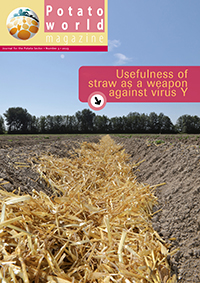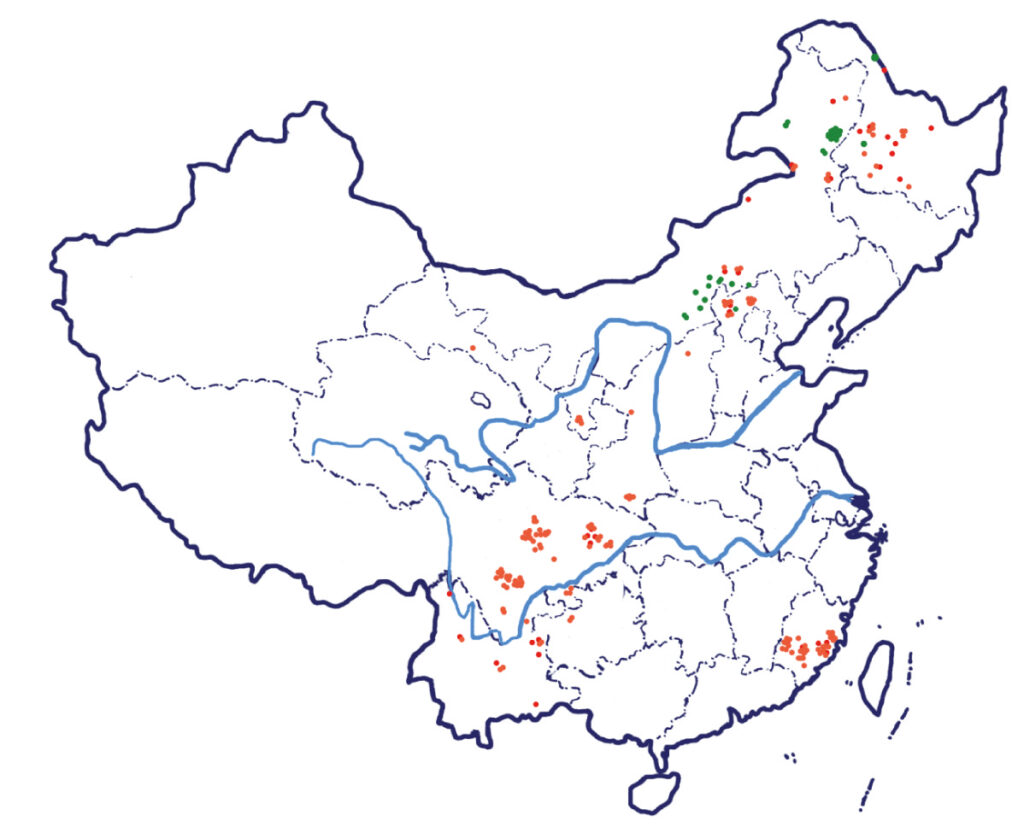Already a subscriber? Activate your premium account

Potatoworld Magazine

Late blight is the most devastating potato disease and control and losses globally exceed € 5 billion.The disease is caused by a fungus like organism, a so called oomycete. It attacks the potato though spores that are carried by wind and when leaves are wet for a few hours the spores germinate and enter the leaves.
The organism exudes protein substances – effectors – that when recognized by a particular potato variety leads to a hyper sensitivity reaction. The plant kills off a few hundreds of leaf cells around the infected spot and so also kills the invader with it. Phytophthora is able to make hundreds of effectors and if one that is recognized by the plant is replaced by an effector that the plant does not recognize (it then misses the resistance gene) the disease will develop through all leaves of the plant. Until a few dozens of years in Europe there was only one type of Phytophthora, the A1 type, that multiplied clonally. Then from Mexico another type emerged and spreaded over the world, the A2 type, that is able to mate with A1 causing more heterogeneous and aggressive strains. The mating product also produces different spores (oospores) that live much longer and can even survive in the soils making the disease partly soil borne.

In 2005 a new and very aggressive strain of the A2 mating type of Phytophthora was found in Ipswich in the United Kingdom which scientists coded Bleu 13. It reproduces faster than other strains, makes larger lesions, grows at lower temperatures is not recognized by some previously resistant varieties and some fungicides are less effective to control it. In recent years also a strain of the A1 mating type is emerging in England and spreading “Pink 6”. In England 80 % of the Phytophthora population now belongs to Blue 13, in the Netherlands 50 %. There are still many countries that do not have the A2 mating type nor its Blue 13 strain but it seems just a matter of time and its presence may become global.
Mid this year Dr Ying Li defended her PhD thesis at Wageningen university entitled “Multiplex SSR analysis of Phytophthora infestans in different countries and the importance for potato breeding” SSRs are “simple sequence repeats” that are fragments of DNA repeated hundreds of times. Their molecular analysis allows grouping related strains of organisms. She collected samples of Phytophthora in four countries China (the figure shows the sampling of China), Ecuador, the Netherlands and Tunisia. China proofed to have four genetically distinct clusters of Phytophthora. Surprisingly in Cluster III strain Blue 13 is present and was found in a number of provinces but not in Heilongjiang and Fujian. The author gave no clue how this EU strain ended up in China. Also it is not clear why the strains found in Heilongjiang (Clusters I and II) were not found in Fujian that has its own Cluster 5 that is not present anywhere else in China. In Fujian potato is grown in winter and virtually all its seed is imported from Heilongjiang. Maybe the summer tomato crop develops its own strain that is transferred to the winter potato crop? Similarly Tunisia that each spring imports its seed from Northern Europe – although it has the two mating types – does not have the Blue 13 strain and has a Phytophthora population that is very distinct from that of Europe. In Ecuador the A2 mating type is not present and variation among strains is less than was suspected given the variability in growing conditions in the country. In the Netherlands three distinct Phytophthora populations were identified. Also here there is one population (Pop I) that dominates in one particular area: the North East of the country with its own cultivars and fungicides regime. The study also revealed that sexually reproduced late blight overcame the resistance given to a variety with one of the R-genes from the Mexican wild species S. bulbocastanum. Still many mysteries surround the disease but they become fewer with the clever use of molecular techniques as Dr Li’s research showed. ●
Anton Haverkort
anton.haverkort@wur.nl
Events
©2015 - 2024 Potatoworld | Webdesign and realisation COMMPRO